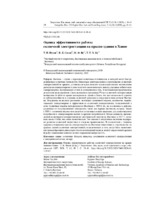| dc.contributor.author | Нгуен, Т. Н. | |
| dc.contributor.author | Сизов, В. Д. | |
| dc.contributor.author | Ву, М. Ф. | |
| dc.contributor.author | Ку, Т. Т. Х. | |
| dc.coverage.spatial | Минск | ru |
| dc.date.accessioned | 2020-02-05T07:43:18Z | |
| dc.date.available | 2020-02-05T07:43:18Z | |
| dc.date.issued | 2020 | |
| dc.identifier.citation | Оценка эффективности работы солнечной электростанции на крыше здания в Ханое = Evaluation of Work Efficiency of the Solar Power Plant Installed on the Roof of a House in Hanoi City / Т. Н. Нгуен [и др.] // Энергетика. Известия высших учебных заведений и энергетических объединений СНГ. – 2020. – № 1. – С. 30-41. | ru |
| dc.identifier.uri | https://rep.bntu.by/handle/data/63840 | |
| dc.description.abstract | Вьетнам – страна с огромным солнечным потенциалом, в которой могут быстро развиваться солнечные технологии. Инвесторы заинтересованы в строительстве солнечных электростанций на крышах, установка которых поможет владельцам снизить ежемесячные расходы на электроэнергию и даже получить экономическую выгоду, продавая избыточную электроэнергию, поступающую от них в электрическую сеть. В исследовании представлены результаты моделирования с использованием программы PVsyst солнечной электростанции мощностью 26 кВтп на крыше коммерческого здания в Ханое, что дает возможность оценить ее работоспособность в условиях солнечной радиации в северо-восточном регионе Вьетнама. Результаты позволили рассчитать потенциал солнечной энергии, количество вырабатываемой электроэнергии и эффективность солнечной электростанции, подключенной к сети. Солнечная энергия используется во Вьетнаме с 1990-х гг., но в основном в районах, удаленных от государственной электросети, таких как горные местности, острова. Также с 2010 г. солнечная энергия используется в отдельных жилых кварталах для удовлетворения потребности в электроэнергии мелких и средних потребителей. Общая мощность произведенной солнечными электростанциями электрической энергии во Вьетнаме к 2017 г. составила около 8 МВт, что очень незначительно. Это связано с отсутствием политики поддержки развития солнечной энергетики со стороны правительства. В соответствии с текущим графиком повышения цен на электроэнергию во Вьетнаме инвестиции в строительство на крышах зданий солнечных электростанций, подключенных к сети, могут быть экономически целесообразными, внося при этом положительный вклад в защиту окружающей среды и борьбу с изменением климата за счет сокращения выбросов CO2. | ru |
| dc.language.iso | ru | ru |
| dc.publisher | БНТУ | ru |
| dc.title | Оценка эффективности работы солнечной электростанции на крыше здания в Ханое | ru |
| dc.title.alternative | Evaluation of Work Efficiency of the Solar Power Plant Installed on the Roof of a House in Hanoi City | ru |
| dc.type | Article | ru |
| dc.identifier.doi | 10.21122/1029-7448-2020-63-1-30-41 | |
| local.description.annotation | Vietnam is a country of a great solar potential; solar technology is growing rapidly in Vietnam and investors are very interested in building solar power plants. Construction of the rooftop solar power stations can help owners reduce monthly electricity costs and even get economic benefits by selling excess electricity coming from a solar power plant (PV) to the utility grid. In this study, the design results of a rooftop grid-tied solar power station with the capacity of 26 kWp for a commercial building were introduced to have a basis to assess the operation ability of solar power station under solar radiation conditions in Hanoi city, Vietnam. The simulation results using the PVsyst program have made it possible to calculate the solar energy potential in Hanoi city, the power generation and efficiency of the grid-tied solar power station. Solar power has been applied in Vietnam since the 1990s but is mainly used for areas that were far from national power grid such as mountainous areas, islands. Small scale grid-tied solar power has been developed since 2010 and mainly is used for residential applications or small and medium scale consumers. The total capacity of electricity produced by solar power plants in Vietnam by 2017 was only about 8 MW; this value is very low as compared to the potential of solar power in Vietnam. This is due to the absence of the government support for the policy of developing solar power. In accordance with the current roadmap of raising electricity prices in Vietnam, construction investment of rooftop solar power stations is economically feasible while contributing to environmental protection and counteracting climate change phenomenon by reducing the amount of CO2 emitted into the environment. | ru |

